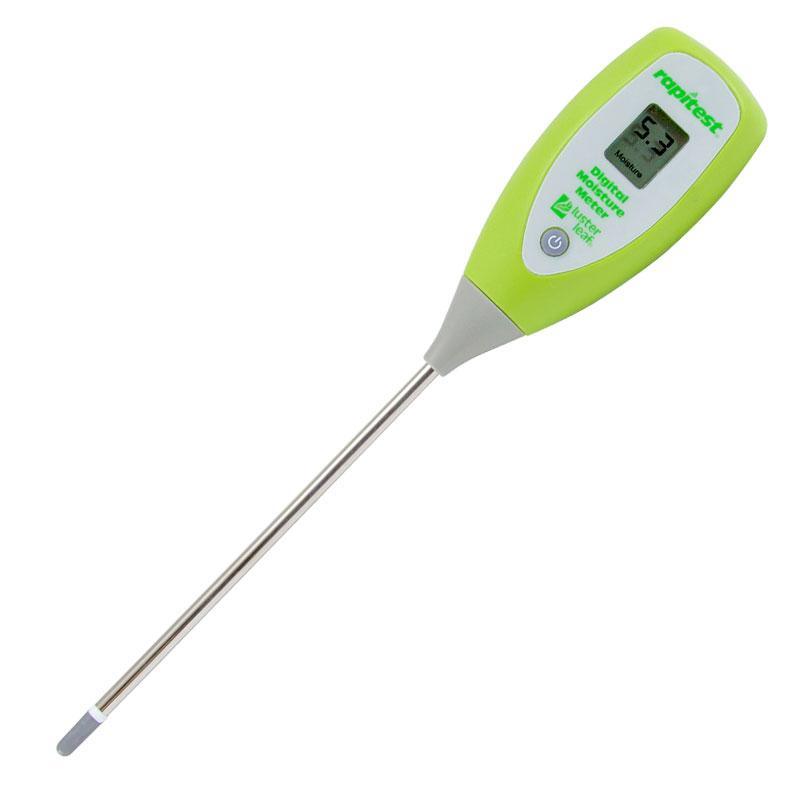Why Every Homeowner Needs a Moisture Meter: Secret Advantages and Functions
Why Every Homeowner Needs a Moisture Meter: Secret Advantages and Functions
Blog Article
The Ultimate Guide to Moisture Meters: A Comprehensive Summary and How They Can Conserve You Cash
Moisture meters offer as vital tools in identifying and keeping an eye on moisture content in materials, aiding in stopping pricey damages and making sure the top quality of products. Recognizing the nuances of various types of moisture meters, their applications, and the potential cost-saving benefits they use can be a game-changer for organizations and specialists alike.
Sorts Of Dampness Meters
Different sorts of wetness meters are readily available for various applications in numerous sectors. One typical kind is the pin-type wetness meter, which gauges the electrical resistance between 2 pins inserted into a product. This kind appropriates for wood, drywall, and other structure materials. Pinless moisture meters, on the various other hand, use electro-magnetic sensor plates to scan a bigger area without creating damage to the material's surface area. Moisture Meter. These meters are excellent for promptly assessing wetness levels in huge locations such as floors and walls.

In addition, there are additionally specialty wetness meters made for particular products like hay, grain, or dirt. These meters give accurate moisture analyses customized to the one-of-a-kind properties of the product being tested. Infrared moisture meters measure the thermal properties of a product to identify its dampness content non-invasively, making them valuable for applications where pin or pinless meters might not appropriate. Understanding the different kinds of wetness meters offered can assist industries choose one of the most suitable device for their specific moisture measurement requirements.

Advantages of Using Moisture Meters
Moisture meters offer invaluable benefits in precisely keeping track of and analyzing moisture levels in varied products and settings. One of the key advantages of making use of moisture meters is the prevention of potential damage caused by excess moisture.
Additionally, utilizing moisture meters can result in increased power performance. By identifying locations with high wetness levels, such as leakages or bad insulation, changes can be made to enhance power preservation and decrease utility prices. In farming setups, wetness meters play a vital role in optimizing crop returns by making it possible for farmers to check dirt dampness levels and make informed watering choices. In general, the advantages of making use of moisture meters extend throughout different industries, supplying economical remedies and advertising much better quality assurance methods.
Exactly How to Select the Right Dampness Meter
Choosing the proper wetness meter involves taking into consideration vital variables such as product compatibility, measurement range, and calibration accuracy. When choosing a dampness meter, it's vital to ensure that the meter is ideal for the details material you will be screening. Different products have differing electric homes that can affect wetness analyses, so selecting a meter created for your product is critical for precise outcomes. Furthermore, consider the dimension range of the wetness meter. Make certain that the meter can spot wetness degrees within the array needed for your applications. Calibration precision is an additional crucial variable to bear in mind. Go with a moisture meter with reputable calibration to guarantee constant and accurate analyses. Some meters might require periodic calibration changes, so recognizing the calibration procedure is crucial. By carefully assessing these variables, you can choose a wetness meter that fulfills your requirements and offers precise dampness dimensions for your projects.
Correct Strategies for Dampness Meter Usage

Price Financial Savings Via Wetness Meter Applications
Just how can the critical application of wetness meters lead to considerable expense financial savings throughout numerous sectors? In the farming sector, moisture meters help in identifying the optimal time for gathering plants, stopping excess or over-drying dampness that can impact the final item's quality.
Similarly, in construction, moisture meters help prevent costly damages by detecting dampness degrees in structure materials, such as timber or concrete, which can bring about structural issues if not addressed quickly. By determining problem areas early on, contractors can take rehabilitative procedures to prevent substantial repair services or substitutes, ultimately conserving money and time.
Moreover, in the food handling industry, dampness meters are necessary for keeping an eye on item high quality and making sure conformity with safety policies. By precisely measuring wetness content in food items, manufacturers can protect against wasting, preserve quality, and decrease waste, leading to significant cost financial savings. Generally, the strategic application of dampness meters is a beneficial investment that can bring about significant expense click to find out more decreases and boosted performance throughout different industries.
Verdict
In verdict, wetness meters are valuable devices for finding and measuring wetness levels in different materials. By making use of the best moisture meter and following correct methods, users can properly stop costly problems triggered by excess dampness.
Dampness meters serve as important devices in discovering and checking moisture material in products, aiding in protecting against expensive problems and making sure the high quality of items. Infrared wetness meters measure the thermal residential or commercial properties of a material to establish its dampness web content non-invasively, making them helpful for applications where pin or pinless meters might not be ideal.Wetness meters supply indispensable advantages in properly analyzing and keeping an eye on wetness degrees in diverse materials find out this here and settings. In agricultural settings, wetness meters play a vital role in enhancing plant yields by enabling farmers to keep track of soil moisture levels and make informed watering decisions.In conclusion, wetness meters are important tools for determining and discovering dampness degrees in different products.
Report this page